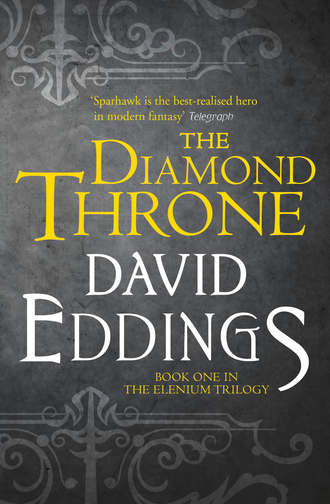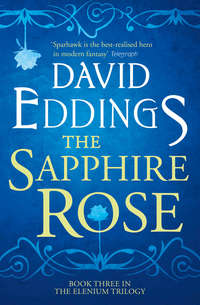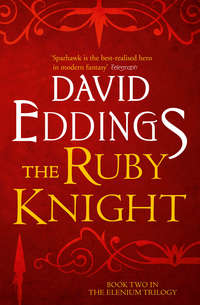
Полная версия
The Diamond Throne
His senses had become preternaturally alert. He could clearly hear the guttering of the torches along the sides of the square and see their orange flicker reflected in the puddles of water lying among the cobblestones. That reflected glow seemed for some reason very beautiful. Sparhawk felt good – better perhaps than he had for ten years.
‘Sir Knight? Sir Sparhawk? Can that be you?’
Startled, Sparhawk turned quickly, swearing under his breath. The man who had accosted him had long, elegantly curled blond hair. He wore a saffron-coloured doublet, lavender hose, and an apple-green cloak. His wet maroon shoes were long and pointed, and his cheeks were rouged. The small, useless sword at his side and his broad-brimmed hat with its dripping plume marked him as a courtier, one of the petty functionaries and parasitic hangers-on who infested the palace like vermin.
‘What are you doing back here in Cimmura?’ the fop demanded, his high-pitched, effeminate voice startled. ‘You were banished.’
Sparhawk looked quickly at the man he had been following. Krager was nearing the entrance to a street that opened into the square, and in a moment he would be out of sight. It was still possible, however. One quick, hard blow would put this over-dressed butterfly before him to sleep, and Krager would still be within reach. Then a hot disappointment filled Sparhawk’s mouth as a detachment of the watch marched into the square with lumbering tread. There was no way now to dispose of this interfering popinjay without attracting their attention. The look he directed at the perfumed man barring his path was flat with anger.
The courtier stepped back nervously, glancing quickly at the soldiers who were moving along in front of the booths, checking the fastenings on the rolled-down canvas fronts. ‘I insist that you tell me what you’re doing back here,’ he said, trying to sound authoritative.
‘Insist? You?’ Sparhawk’s voice was full of contempt.
The other man looked quickly at the soldiers again, seeking reassurance, then he straightened boldly. ‘I’m taking you in charge, Sparhawk. I demand that you give an account of yourself.’ He reached out and grasped Sparhawk’s arm.
‘Don’t touch me,’ Sparhawk spat out the words, striking the hand away.
‘You hit me!’ the courtier gasped, clutching at his hand in pain.
Sparhawk took the man’s shoulder in one hand and pulled him close. ‘If you ever put your hands on me again, I’ll rip out your guts. Now get out of my way.’
‘I’ll call the watch,’ the fop threatened.
‘And how long do you think you’ll continue to live after you do that?’
‘You can’t threaten me. I have powerful friends.’
‘But they’re not here, are they? I am, however.’ Sparhawk pushed him away in disgust and turned to walk on across the square.
‘You Pandions can’t get away with this high-handed behaviour any more. There are laws in Elenia now,’ the overdressed man called after him shrilly. ‘I’m going straight to Baron Harparin. I’m going to tell him that you’ve come back to Cimmura and about how you hit me and threatened me.’
‘Good,’ Sparhawk replied without turning. ‘Do that.’ He continued to walk away, his irritation and disappointment rising to the point where he had to clench his teeth tightly to keep himself under control. Then an idea came to him. It was petty –even childish – but for some reason it seemed quite appropriate. He stopped and straightened his shoulders, muttering under his breath in the Styric tongue, even as his fingers wove intricate designs in the air in front of him. He hesitated slightly, groping for the word for carbuncle. He finally settled for boils instead and completed the incantation. He turned slightly, looked at his tormentor, and released the spell. Then he turned back and continued on across the square, smiling slightly to himself. It was, to be sure, quite petty, but Sparhawk was like that sometimes.
He handed the food vendor a coin for minding Faran, swung up into his saddle, and rode across the square in the misty drizzle, a big man shrouded in a rough woollen cloak, astride an ugly-faced roan horse.
Once he was past the square, the streets were dark and empty again, with guttering torches hissing in the rain at intersections and casting their dim, sooty orange glow. The sound of Faran’s hooves was loud in the empty street. Sparhawk shifted slightly in his saddle. The sensation he felt was very faint, a kind of prickling of the skin across his shoulders and up the back of his neck, but he recognized it immediately. Someone was watching him, and the watcher was not friendly. Sparhawk shifted again, carefully trying to make the movement appear to be no more than the uncomfortable fidgeting of a saddle-weary traveller. His right hand, however, was concealed beneath his cloak, and it sought the hilt of his sword. The oppressive sense of malevolence increased, and then, in the shadows beyond the flickering torch at the next intersection, he saw a figure robed and hooded in a dark grey garment that blended so well into the shadows and wreathing drizzle that the watcher was almost invisible.
The roan tensed his muscles, and his ears flicked.
‘I see him, Faran.’ Sparhawk replied very quietly.
They continued on along the cobblestone street, passing through the pool of orange torchlight and on into the shadowy street beyond. Sparhawk’s eyes readjusted to the dark, but the hooded figure had already vanished up some alleyway or through one of the narrow doors along the street. The sense of being watched was gone, and the street was no longer a place of danger. Faran moved on, his hooves clattering on the wet stones.
The inn which was Sparhawk’s destination was on an unobtrusive back street. It was gated at the front of its central courtyard with stout oaken planks. Its walls were peculiarly high and thick, and a single, dim lantern glowed beside a much-weathered wooden sign that creaked mournfully as it swung back and forth in the rain-filled night breeze. Sparhawk pulled Faran close to the gate, leaned back in his saddle, and kicked the rain-blackened planks solidly with one spurred foot. There was a peculiar rhythm to the kicks.
He waited.
Then the gate creaked inward and the shadowy form of a porter, hooded in black, looked out. He nodded briefly, then pulled the gate wider to admit Sparhawk. The big knight rode into the rain-wet courtyard and slowly dismounted. The porter swung the gate shut and barred it, then he pushed his hood back from his steel helm, turned, and bowed. ‘My Lord,’ he greeted Sparhawk respectfully.
‘It’s too late at night for formalities, Sir Knight,’ Sparhawk responded, also with a brief bow.
‘Formality is the very soul of gentility, Sir Sparhawk,’ the porter replied ironically. ‘I try to practise it whenever I can.’
‘As you wish.’ Sparhawk shrugged. ‘Will you see to my horse?’
‘Of course. Your man, Kurik, is here.’
Sparhawk nodded, untying the two heavy leather bags from the skirt of his saddle.
‘I’ll take those up for you, my Lord,’ the porter offered.
‘There’s no need. Where’s Kurik?’
‘First door at the top of the stairs. Will you want supper?’
Sparhawk shook his head. ‘Just a bath and a warm bed.’ He turned to his horse, who stood dozing with one hind leg cocked slightly so that his hoof rested on its tip. ‘Wake up, Faran,’ he told the animal.
Faran opened his eyes and gave him a flat, unfriendly stare.
‘Go with this knight,’ Sparhawk instructed firmly. ‘Don’t try to bite him, or kick him, or pin him against the side of the stall with your rump – and don’t step on his feet, either.’
The big roan briefly laid back his ears and then sighed.
Sparhawk laughed. ‘Give him a few carrots,’ he instructed the porter.
‘How can you tolerate this foul-tempered brute, Sir Sparhawk?’
‘We’re perfectly matched,’ Sparhawk replied. ‘It was a good ride, Faran,’ he said then to the horse. ‘Thank you, and sleep warm.’
The horse turned his back on him.
‘Keep your eyes open, Sir Knight,’ Sparhawk cautioned the porter. ‘Someone was watching me as I rode here, and I got the feeling that it was a little more than idle curiosity.’
The knight porter’s face hardened. ‘I’ll attend to it, my Lord,’ he said.
‘Good.’ Sparhawk turned and crossed the wet, glistening stones of the courtyard and mounted the steps leading to the roofed gallery on the upper floor of the inn.
The inn was a well-kept secret that few in Cimmura knew about. Though ostensibly no different from any of dozens of others, this particular establishment was owned and operated by the Knights Pandion, and it provided a safe haven for any of their number who, for one reason or another, were reluctant to avail themselves of the facilities of their chapterhouse on the eastern outskirts of the city.
At the top of the stairs, Sparhawk stopped and tapped his fingertips lightly on the first door. After a moment, the door opened. The man inside was burly, and he had iron-grey hair and a coarse, short-trimmed beard. His hose and boots were of black leather, and his long waistcoat was of the same material. A heavy dagger hung from his belt, steel cuffs encircled his wrists, and his heavily-muscled arms and shoulders were bare. He was not a handsome man, and his eyes were as hard as agates. ‘You’re late,’ he said flatly.
‘A few interruptions along the way,’ Sparhawk replied laconically, stepping into the warm, candlelit room. The bare-shouldered man closed the door behind him and slid the bolt with a solid clank. Sparhawk looked at him. ‘I trust you’ve been well, Kurik?’ he said to the man he had not seen for ten years.
‘Passable. Get out of that wet cloak.’
Sparhawk grinned, dropped his saddlebags to the floor and undid the clasp of his dripping woollen cloak. ‘How are Aslade and the boys?’
‘Growing,’ Kurik grunted, taking the cloak. ‘My sons are getting taller and Aslade’s getting fatter. Farm life agrees with her.’
‘You like plump women, Kurik,’ Sparhawk reminded his squire. ‘That’s why you married her.’
Kurik grunted again, looking critically at his Lord’s lean frame. ‘You haven’t been eating, Sparhawk,’ he accused.
‘Don’t mother me, Kurik.’ Sparhawk sprawled in a heavy oak chair. He looked around. The room had a stone floor and stone walls. The ceiling was low, with heavy black beams supporting it. A fire crackled in an arched fireplace, filling the room with dancing light and shadows. Two candles burned on the table, and two narrow cots stood, one against either wall. It was to the heavy rack beside the single blue-draped window that Sparhawk’s eyes went first, however. Hanging on that rack was a full suit of armour, enamelled shiny black; leaning against the wall beside it was a large black shield with the emblem of his family, a hawk with flared wings and with a spear in its talons, worked in silver upon its face. Beside the shield stood a massive, sheathed broadsword with a silver-bound hilt.
‘You forgot to oil it when you left,’ Kurik accused. ‘It took me a week to get the rust off. Give me your foot.’ He bent and worked off one of Sparhawk’s riding boots and then the other. ‘Why do you always have to walk in the mud?’ he growled, tossing the boots over beside the fireplace. ‘I’ve got a bath ready for you in the next room,’ he said then. ‘Strip. I want to see those wounds of yours anyway.’
Sparhawk sighed wearily and stood up. With his gruff squire’s peculiarly gentle help, he undressed.
‘You’re wet clear through,’ Kurik noted, touching his Lord’s clammy back with one rough, callused hand.
‘Rain does that to people sometimes.’
‘Did you ever see a surgeon about these?’ the squire demanded, lightly touching the wide purple scars on Sparhawk’s shoulders and left side.
‘A physician looked at them. There wasn’t a surgeon handy, so I left them to heal by themselves.’
Kurik nodded. ‘It shows,’ he said. ‘Go and get in the tub. I’ll fetch something for you to eat.’
‘I’m not hungry.’
‘That’s too bad. You look like a skeleton. Now that you’re back, I’m not going to let you walk around in that condition.’
‘Why are you bullying me, Kurik?’
‘Because I’m angry. You frightened me half to death. You’ve been gone for ten years, and there’s been little news – and all of it bad.’ The gruff man’s eyes grew momentarily soft, and he roughly grasped Sparhawk’s shoulders in a grip that might have brought a lesser man to his knees. ‘Welcome home, my Lord,’ he said in a thick voice.
Sparhawk roughly embraced his friend. ‘Thank you, Kurik,’ he said, his voice also thick. ‘It’s good to be back.’
‘All right,’ Kurik said, his face hard again. ‘Now get in the tub. You stink.’ And he turned on his heel and went to the door.
Sparhawk smiled and walked into the next room. He stepped into the wooden tub and sank gratefully down into the steaming water. He had been another man with another name – a man called Mahkra – for so long now that he knew that no simple bath would wash that other identity away, but it was good to relax and let the hot water and coarse soap rinse the dust of that dry, sun-blasted coast from his skin. In a kind of detached reverie as he washed his lean, scarred limbs, he remembered the life he had led as Mahkra in the city of Jiroch in Rendor. He remembered the small, cool shop where, as an untitled commoner, Mahkra had sold brass ewers, candied sweetmeats, and exotic perfumes while the bright sunlight reflected blindingly from the thick, white walls across the street. He remembered the hours of endless talk in the little wine shop on the corner, where Mahkra had sipped sour, resinous Rendorish wine by the hour and had delicately, subtly, probed for the information which was then passed on to his friend and fellow Pandion, Sir Voren – information concerning the reawakening of Eshandist sentiment in Rendor, of secret caches of arms hidden in the desert and of the activities of the agents of Emperor Otha of Zemoch. He remembered the soft, dark nights filled with the clinging perfume of Lillias, Mahkra’s sulking mistress, and of the beginning of each day when he had arisen and gone to the window to watch the women going to the wells in the steel-grey light of sunless dawn. He sighed. ‘And who are you now, Sparhawk?’ he asked himself softly. ‘No longer a merchant in brass and candied dates and perfumes, certainly, but once again a Knight Pandion? A magician? The Queen’s Champion? Perhaps not. Perhaps no more than a battered and tired man with a few too many years and scars and far too many skirmishes behind him.’
‘Didn’t it occur to you to cover your head while you were in Rendor?’ Kurik asked sourly from the doorway. The burly squire held a robe and a rough towel. ‘When a man starts talking to himself, it’s a sure sign that he’s been out in the sun too long.’
‘Just musing, Kurik. I’ve been a long time away from home, and it’s going to take a while to get used to it again.’
‘You may not have a while. Did anyone recognize you when you rode in?’
Sparhawk remembered the fop in the square and nodded. ‘One of Harparin’s toadies saw me in the square near the west gate.’
‘That’s it, then. You’re going to have to present yourself at the palace tomorrow, or Lycheas will have Cimmura taken apart stone by stone searching for you.’
‘Lycheas?’
‘The Prince Regent – bastard son to Princess Arissa and whatever drunken sailor or unhanged pickpocket got him on her.’
Sparhawk sat up quickly, his eyes hardening. ‘I think you’d better explain a few things, Kurik,’ he said. ‘Ehlana’s the Queen. Why does her kingdom need a Prince Regent?’
‘Where have you been, Sparhawk? On the moon? Ehlana fell ill a month ago.’
‘Not dead?’ Sparhawk demanded with a sudden sinking in his stomach and a wrench of unbearable loss at the memory of the pale, beautiful girl-child with the grave, serious grey eyes whom he had watched throughout her childhood and whom, in a peculiar way, he had come to love, though she had been but eight years old when King Aldreas had sent him into his exile in Rendor.
‘No,’ Kurik replied, ‘not dead, though she might as well be.’ He picked up the large, rough towel. ‘Come out of the tub,’ he ordered. ‘I’ll tell you about it while you eat.’
Sparhawk nodded and stood up. Kurik roughly towelled him off and then draped the soft robe about him. The table in the other room was laid with a platter of steaming slices of meat swimming in gravy, a half-loaf of rough, dark peasant bread, a wedge of cheese, and a pitcher of chilled milk. ‘Eat,’ Kurik said.
‘What’s been going on here?’ Sparhawk demanded as he seated himself at the table and started to eat. He was surprised to find that he was suddenly ravenous. ‘Start at the beginning.’
‘All right,’ Kurik agreed, drawing his dagger and starting to carve thick slices of bread from the loaf. ‘You knew that the Pandions were confined to the motherhouse at Demos after you left, didn’t you?’
Sparhawk nodded. ‘I heard about it. King Aldreas was never really very fond of us.’
‘That was your father’s fault, Sparhawk. Aldreas was very fond of his sister, and then your father forced him to marry someone else. That sort of soured his attitude towards the Pandion Order.’
‘Kurik,’ Sparhawk said, ‘it’s not proper to talk about the king that way.’
Kurik shrugged. ‘He’s dead now, so it doesn’t hurt him, and the way he felt about his sister was common knowledge anyway. The palace pages used to take money from anyone who wanted to watch Arissa walk mother-naked through the upper halls to her brother’s bedchamber. Aldreas was a weak king, Sparhawk. He was totally under the control of Arissa and the Primate Annias. With the Pandions confined at Demos, Annias and his underlings had things pretty much the way they wanted them. You were lucky not to have been here during those years.’
‘Perhaps,’ Sparhawk murmured. ‘What did Aldreas die from?’
‘They say that it was the falling-sickness. My guess would be that the whores Annias used to slip into the palace for him after his wife died finally wore him out.’
‘Kurik, you gossip worse than an old woman.’
‘I know,’ Kurik admitted blandly. ‘It’s a vice I have.’
‘And then Ehlana was crowned Queen?’
‘Right. And then things started to change. Annias was certain that he’d be able to control her the same way that he’d been able to control Aldreas, but she brought him up short. She summoned Preceptor Vanion from the motherhouse at Demos and made him her personal advisor. Then she told Annias to make preparations to retire to a monastery to meditate on the virtues proper to a churchman. Annias was livid, of course, and he started to scheme immediately. The messengers were as thick as flies on the road between here and the cloister where the Princess Arissa has been confined. They’re old friends, and they had certain common interests. At any rate, Annias suggested that Ehlana should marry her bastard cousin, Lycheas, but she laughed in his face.’
‘That sounds fairly characteristic,’ Sparhawk smiled. ‘I raised her myself and I taught her what was appropriate. What is this illness of hers?’
‘It appears to be the same one that killed her father. She had a seizure and never regained consciousness. The court physicians all maintained that she wouldn’t live out the week, but then Vanion took steps. He appeared at court with Sephrenia and eleven other Pandions – all in full armour and with their visors down. They dismissed the Queen’s attendants, took her from her bed, clothed her in her state robes and put the crown on her head. Then they carried her to the great hall and set her on the throne and locked the door. Nobody knows what they did in there, but when they opened the door again, Ehlana sat on her throne encased in crystal.’
‘What?’ Sparhawk exclaimed.
‘It’s as clear as glass. You can see every freckle on the Queen’s nose, but you can’t get near her. The crystal’s harder than diamond. Annias had workmen hammering on it for five days, and they couldn’t even chip it.’ Kurik looked at Sparhawk. ‘Could you do something like that?’ he asked curiously.
‘Me? Kurik, I wouldn’t even know where to start. Sephrenia taught us the basics, but we’re like babies compared to her.’
‘Well, whatever it was that she did, it’s keeping the Queen alive. You can hear her heart beating. It echoes through the throne room like a drum. For the first week or so, people were flocking in there just to listen to it. There was even talk that it was some kind of miracle and that the throne room ought to be made a shrine. But Annias locked the door and summoned Lycheas the bastard to Cimmura and set him up as Prince Regent. That was about two weeks ago. Since then Annias has had the church soldiers rounding up all his enemies. The dungeons under the cathedral are bulging with them. That’s where things stand right now. You picked a good time to come back.’ He paused, looking directly into his lord’s face. ‘What happened in Cippria, Sparhawk?’ he asked. ‘The news we got here was pretty sketchy.’
Sparhawk shrugged. ‘It wasn’t much. Do you remember Martel?’
‘The renegade Vanion stripped of his knighthood? The one with white hair?’
Sparhawk nodded. ‘He came to Cippria with a couple of underlings, and they hired fifteen or twenty cutthroats to help them. They waylaid me in a dark street.’
‘Is that where you got the scars?’
‘Yes.’
‘But you got away.’
‘Obviously. Rendorish murderers are a trifle squeamish when the blood on the cobblestones and splashed all over the walls happens to be theirs. After I cut down a dozen or so of them, the rest sort of lost heart. I got clear of them and made my way to the edge of town. I hid in a monastery until the wounds healed, then I took Faran and joined a caravan for Jiroch.’
Kurik’s eyes were shrewd. ‘Do you think there’s any possibility that Annias might have been involved in it?’ he asked. ‘He hates your family, you know, and it’s fairly certain that he was the one who persuaded Aldreas to exile you.’
‘I’ve had the same thought from time to time. Annias and Martel have had dealings before. At any rate, I think the good primate and I have several things to discuss.’
Kurik looked at him, recognizing the tone in his voice. ‘You’re going to get into trouble,’ he warned.
‘Not as much as Annias will if I find out that he had a hand in that attack.’ Sparhawk straightened. ‘I’m going to need to talk with Vanion. Is he still here in Cimmura?’
Kurik nodded. ‘He’s at the chapterhouse on the east edge of town, but you can’t get there right now. They lock the east gate at sundown. I think you’d better present yourself at the palace right after the sun comes up, though. It won’t take Annias long to come up with the idea of declaring you outlaw for breaking your exile, and it’s better to appear on your own, rather than be dragged in like a common criminal. You’re still going to have to do some fast talking to stay out of the dungeon.’
‘I don’t think so,’ Sparhawk disagreed. ‘I’ve got a document with the Queen’s seal on it authorizing my return.’ He pushed back his plate. ‘The handwriting’s a little childish, and there are tearstains on it, but I think it’s still valid.’
‘She cried? I didn’t think she knew how.’
‘She was only eight at the time, Kurik, and quite fond of me, for some reason.’
‘You have that effect on a few people.’ Kurik looked at Sparhawk’s plate. ‘Have you had all of that you want?’
Sparhawk nodded.
‘Then get you to bed. You’ve got a busy day ahead of you tomorrow.’
It was much later. The room was faintly lit with the orange coals of the banked fire, and Kurik’s regular breathing came from the cot on the other side of the room. The insistent, nagging bang of an unlatched shutter swinging freely in the wind several streets over had set some brainless dog to barking, and Sparhawk lay, still half-bemused by sleep, patiently waiting for the dog to grow wet enough or weary enough of his entertainment to seek his kennel again.
Since it had been Krager he had seen in the square, there was no absolute certainty that Martel was in Cimmura. Krager was an errand boy and was frequently half a continent away from Martel. Had it been the brutal Adus who had crossed that rainy square, there would be no question as to Martel’s presence in the city. Of necessity, Adus had to be kept on a short leash.







